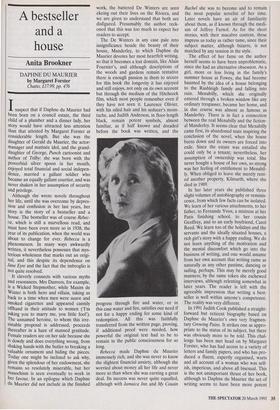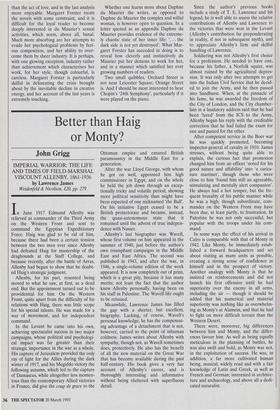A bestseller and a house
Anita Brookner
DAPHNE DU MAURIER by Margaret Forster Chatto, f17.99, pp. 476 Isuspect that if Daphne du Maurier had been born on a council estate, the third child of a plumber and a dinner lady, her story would have attracted less attention than that attested by Margaret Forster at considerable length. But she was the daughter of Gerald du Maurier, the actor- manager and matinee idol, and the grand- daughter of George, Punch cartoonist and author of Trilby: she was born with the proverbial silver spoon in her mouth, enjoyed total financial and social indepen- dence, married a gallant soldier who became an equally gallant courtier, and was never shaken in her assumption of security and privilege.
Although she wrote novels throughout her life, until she was overcome by depres- sion and confusion in her last years, her story is the story of a bestseller and a house. The bestseller was of course Rebec- ca, which is still a marvellous read, and must have been even more so in 1938, the year of its publication, when the world was about to change for ever. Rebecca is a phenomenon. In many ways awkwardly written, it nevertheless possesses that mys- terious wholeness that marks out an origi- nal, and this despite its dependence on Jane Eyre and the fact that the imbroglio is not quite resolved.
It cleverly connects with various myths and resonances. Mrs Danvers, for example, is a Wicked Stepmother, while Maxim de Winter is both hero and villain, taking us back to a time when men were suave and smoked cigarettes and appeared cannily Offhand in their attitude to women (`I'm asking you to many me, you little fool'). The unnamed heroine, to whom this irre- sistable proposal is addressed, proceeds thereafter in a haze of stunned gratitude. Female readers are on her side because she is dowdy and does everything wrong, from shaking hands with the butler to breaking a valuable ornament and hiding the pieces. Today one might be inclined to ask why, given the splendour of her endowment, she remains so resolutely miserable, but her masochism is seen eventually to work in her favour. In an epilogue which Daphne du Maurier did not include in the finished work, the battered De Winters are seen ekeing out their lives on the Riviera, and we are given to understand that both are disfigured. Presumably the author reck- oned that this was too much to expect her readers to accept.
The De Winters in any case pale into insignificance beside the beauty of their house, Manderley, to which Daphne du Maurier devotes her most heartfelt writing, so that it becomes a lost domain, like Alain Fournier's, and although descriptions of the woods and gardens remain tentative there is enough passion in them to secure for this book the longevity it has enjoyed and still enjoys, not only on its own account but through the medium of the Hitchcock film, which most people remember even if they have not seen it. Laurence Olivier, with his oiled hair and his seducer's mous- tache, and Judith Anderson, in floor-length black, remain potent symbols, almost familiar, as if half known and dreaded before the book was written, and the progress through fire and water, or in this case water and fire, satisfies our need if not for a happy ending for some kind of redemption. All this was faithfully transferred from the written page, proving, if additional proof were needed, how powerful the original text had to be to remain in the public consciousness for so long.
Rebecca made Daphne du Maurier immensely rich, and she was never to know the slightest financial anxiety, although she worried about money all her life and never more so than when she was earning a great deal. Its success was never quite equalled, although with Jamaica Inn and My Cousin Rachel she was to become and to remain the most popular novelist of her time. Later novels have an air of familiarity about them, as if known through the medi- um of Jeffrey Farnol. As for the short stories, with their macabre content, these impress us today as rather tame, since their subject matter, although bizarre, is not matched by any tension in the style.
The effect of her fame on the author herself seems to have been unproblematic, since she had an alternative obsession. As a girl, more or less living in the family's summer house at Fowey, she had become haunted by the idea of a house belonging to the Rashleigh family and falling into ruin. Menabilly, which she originally entered through a broken window like any ordinary trespasser, became her home, and in due course was almost as famous as Manderley. There is in fact a connection between the real Menabilly and the fiction- al Manderley. It seems clear that Menabilly came first, its abandoned state inspiring the conclusion of the novel, when the house burns down and its owners are forced into exile. Since the estate was entailed she could only be a tenant; nevertheless, her assumption of ownership was total. She never bought a house of her own, so strong was her feeling of entitlement to Menabil- ly. When obliged to leave she merely rent- ed another property, Kilmarth, where she died in 1989.
In her later years she published three slight volumes of autobiography or reminis- cence, from which few facts can be isolated. We learn of her various attachments, to her father, to Fernande Yvon, a mistress at her Paris finishing school, to her cousin Geoffrey, and to an early boyfriend, Carol Reed. We learn too of the holidays and the servants and the ideally situated houses, a rich girl's story with a happy ending. We do not learn anything of the motivation and the mental discomfort which go into the business of writing, and one would assume from her own account that writing came as naturally as any other pastime, dancing or sailing, perhaps. This may be merely good manners; by the same token she eschewed interviews, although relenting somewhat in later years. The reader is left with the agreeable impression that writing a best- seller is well within anyone's competence. The reality was very different.
In 1991 Judith Cook published a straight- forward but reticent biography based on Daphne du Maurier's own very fragmen- tary Growing Pains. It strikes one as appro- priate to the status of its subject, but there was obviously more to be told. This chal- lenge has been met head on by Margaret Forster, who has had access to a variety of letters and family papers, and who has pro- duced a fluent, expertly organised, warts and all account of a woman who was self- ish, imperious, and above all bisexual. This is the not unimportant thrust of her book, although to Daphne du Maurier the act of writing seems to have been more potent
than the act of love, and in the last analysis more enjoyable. Margaret Forster treats the novels with some constraint, and it is difficult for the loyal reader to become deeply interested in du Maurier's sexual activities, which seem, above all, banal. Much more absorbing are her attempts to evade her psychological problems by furi- ous composition, and her ability to over- come them by sheer industry. It is perhaps, with one glowing exception, industry rather than achievement which characterises her work, for her style, though colourful, is careless. Margaret Forster is particularly skilful in delineating the crisis brought about by the inevitable decline in creative energy, and her account of the last years is extremely touching. Whether one learns more about Daphne du Maurier the writer, as opposed to Daphne du Maurier the complex and wilful woman, is however open to question. In a letter quoted as an appendix Daphne du Maurier provides evidence of the extreme- ly chaotic state of her inner life: `.. . the dark side is not yet destroyed'. What Mar- garet Forster has suceeded in doing is to reveal how cleverly and instinctively du Maurier put her demons to work for her, and in a manner which satisfied her ever growing numbers of readers.
Two small quibbles. Orchard Street is not near Leicester Square; Orange Street is. And I should be most interested to hear Chopin's '24th Symphony', particularly if it were played on the piano.



























































 Previous page
Previous page